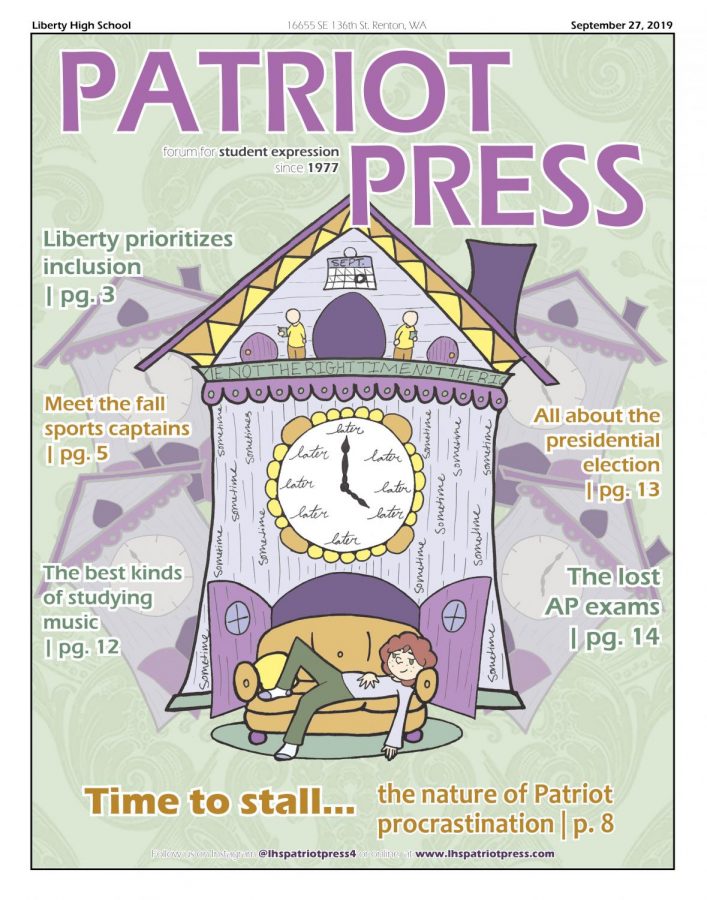We’ll title this later… we just don’t feel like doing it right now
As procrastinators, we don’t feel like doing a lot of things. And by we, I mean everyone, at one point or another. It could even be that straight-A student or teacher who has every lesson in the semester planned out. There is no doubt that procrastination is a productivity disaster, but few procrastinators are speaking up about the fact that laziness is not always the reason. Even fewer of us are willing to admit that procrastination takes away so much more than just our time.
September 24, 2019
Procrastination’s Appeal
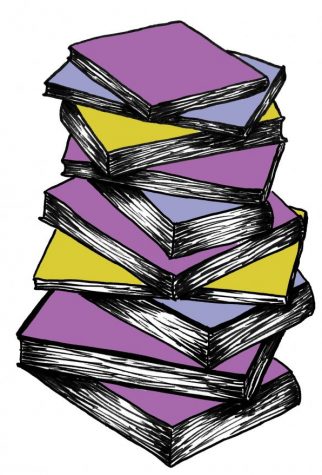 If you ask people around you about their experiences with procrastination, the word you’ll hear the most is “easy.”
If you ask people around you about their experiences with procrastination, the word you’ll hear the most is “easy.”
Junior Erik Lundbeck puts it this way: “In a situation, you always have the option of doing something or not doing something. Not doing something is always the easier option.”
“It’s easier to push things that we don’t want to do aside until we don’t have a choice,” naval science instructor Matthew Spears said.
“It’s easier to distract ourselves than it’s ever been,” school psychologist Rebecca Ragland said.
“I procrastinate on doing all of the hard stuff until the end. I do the easier things first,” sophomore Peyton Pham said.
But choosing the easier option is just being lazy, right? Not exactly. For Pham, the easier option isn’t at all what we’d expect. “Usually, I just work on other homework,” Pham said. She hardly fits what we think of a typical procrastinator, idly watching Netflix or scrolling through Instagram while avoiding work.
That’s because procrastination is not just about productivity. Part of it has to do with our poor judgment of the future and even our self-deception.
of the future and even our self-deception.
“If I put off a problem, it’s not my problem; it’s future Erik’s problem to deal with. Future Erik is someone I can screw over, and he can do nothing back to me,” Lundbeck said.
Junior Rachel Ly agrees that as procrastinators, we have little sympathy for our future selves. We have no problem saving stressful tasks for later because we are more afraid of not being able to enjoy ourselves now. According to Ly, a procrastinator would think, “if I work on this, it’s going to take me forever, and I’m never going to be able to go on my phone or watch TV.”
Subconsciously, some procrastinators truly believe that they are looking out for themselves. “When things get hard, it’s a natural protection to do what is easier to protect us from being more stressed,” Ragland said.
From her experience working with students, social studies and ELL teacher Andrea Antrim agrees that procrastination can be an act of avoiding unpleasant emotions. “It can be the fear of not knowing you’re going to do it right or do it well, so you just keep avoiding and avoiding,” she said.
The Real Price
Procrastination takes away our time, but losing time isn’t the only price procrastinators pay. Ironically, for all the time wasted on avoiding stress and negative emotions, they all find their way back to us–except now, they’re even worse than before.
“You’re going to feel the effects of procrastination eventually, whether that’s physically because you’re tired, mentally because you’re distracted, or emotionally because you’re stressed and worried,” Antrim said.
Losing time equates to sacrificing the opportunity to do the things we allow ourselves to do when we have time. For many procrastinators, that sacrifice is slee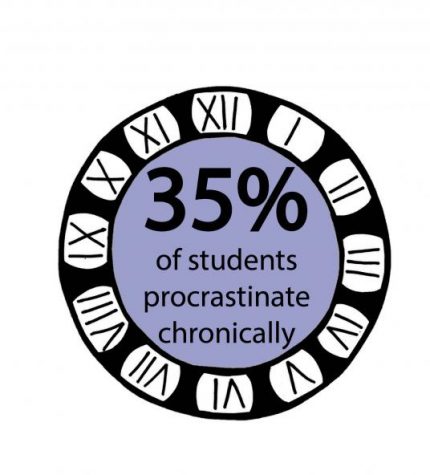 p.
p.
“I’m not sleeping as well, and I’m not as physically ready for the day. It’s something that really snowballs,” Antrim said. The truth is that she’s speaking for a number of students and staff members here at Liberty.
The repercussions of procrastination go beyond physical health, as Ragland would argue that it can also take a toll on your social life. “Part of having a relationship is give and take, so if someone is procrastinating on making plans or following through with things, that can definitely have a negative impact on a relationship,” Ragland said.
For Spears, procrastination takes away the time he would otherwise spend with family. “Sometimes I don’t interact with people because I put things off, and now I am taking my social time to do the things that I didn’t do the first time. It takes away time from my kids,” he said.
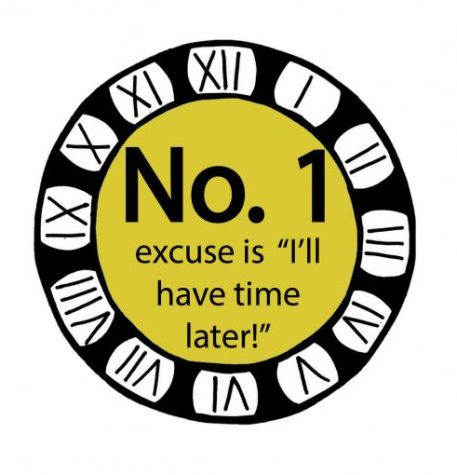 People depending on us is one thing, yet perhaps even more important is our self-dependence. But when we repeatedly save that English paper for the night before it is due, it’s difficult to trust ourselves to make sound decisions for the future.
People depending on us is one thing, yet perhaps even more important is our self-dependence. But when we repeatedly save that English paper for the night before it is due, it’s difficult to trust ourselves to make sound decisions for the future.
“I have worked with students who have procrastinated to the point where they just don’t have the skills to set goals or to advocate for themselves to get ahead of where they’re at,” Ragland said.
Breaking the Cycle
Despite all the things procrastination costs us, learning from our mistakes is easier said than done. Some of us don’t even consider breaking out of the habit.
Ly shares an alternate attitude towards procrastination. “I tried to fix my procrastination in the beginning, but there came a point where it’s working for me. It’s not becoming a big deal in my grades, so I don’t really have a reason to fix it,” she said.
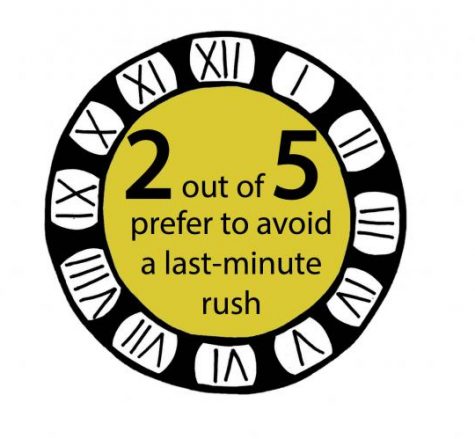 Some even assert that procrastination makes them more efficient than non-procrastinators. “There’s a mentality where people would say, ‘I can do this in five minutes, can you?’” Ly said.
Some even assert that procrastination makes them more efficient than non-procrastinators. “There’s a mentality where people would say, ‘I can do this in five minutes, can you?’” Ly said.
Procrastination looks different for everyone, but for those of us trying to break the cycle, the solution starts from within.
“Take time to identify exactly where you’re at and your goals. I don’t think we give ourselves enough time to do that,” Ragland said.
She shared that Mark Twain’s advice has been especially helpful: “If it’s your job to eat a frog, it’s best to do it first thing in the morning. If it’s your job to eat two frogs, it’s best to eat the biggest one first.”
If that’s too intimidating, Antrim recommends another approach. “Pick one thing to start with, work on it on some sort of regular schedule. Once you see yourself succeeding there, then try the next piece,” she said.
After we’ve decided to beat procrastination and to do it in a way that works for us, the next step is to put ourselves in an environment that supports our efforts.
“If you’re just sitting at home by yourself and there’s no distraction, it’s easier to knock it out and get it done,” Spears said. “It depends on what you can put in the place of the thing you don’t want to do.”
It makes sense. If you know you’re tempted to choose the easier alternative to the task at hand, eliminate the alternative.
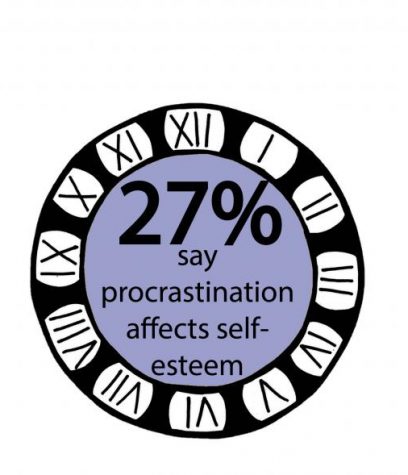
Lundbeck testifies to the effectiveness of this strategy. “For the entirety of the AP World History project, I set my phone in my kitchen. I told myself if I am on my phone, I’m not going to get this done,” he said.Not only that, a supportive environment also includes someone who will make sure you commit to your efforts today, again tomorrow, and again the next day. Right now, that person is me. Go write that English paper.
